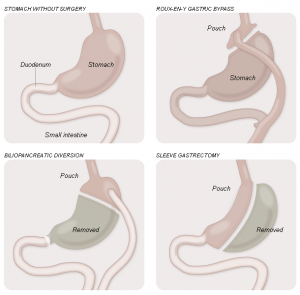I’m having a series of changes made to my mouth to help with my overall gum health and this is the first dramatic step.
Category Archives: Health
11 Months Post Gastric Sleeve
Six Weeks Post-op – My 44th Birthday Present to Myself
Best birthday present was waking up unexpectedly to have reached fifty pound mark of weight loss since gastric sleeve.
Yesterday went shopping at thrift store for some “interim” size clothes and got some other things with my Mom. I try to weigh myself every couple of days, but this morning was truly a shock because I lost six pounds in just a few days, and it didn’t seem like I did all that much, although I did stay pretty active this past weekend.
Three Weeks after Bariatric Surgery (Gastric Sleeve)
Unless you count the temporary liquid and extremely soft food diet, I have so far “effortlessly” lost forty pounds without rigorous exercise. I started losing a little weight before surgery as mandated. Without any hunger I am losing a few pounds every few days and have not had to take a single injection of insulin, nor any oral diabetes medications, nor any cholesterol medications since the operation. I am hoping with more weight loss to soon be off the blood pressure medications, if my doctor approves it, and thereby avoiding the sometimes painful side effects caused by them, like edema. I also appear to not have apnea anymore, at least not very badly. I’m sleeping through the night without the CPAP.
While these pictures are not the most demonstrative of my weight loss, I do have a neck once again. I have also already started putting my largest pants in the donation box and I’m loosely fitting into the skinniest jeans I own. I bought some suspenders for the interim until I need to invest in a new wardrobe since the weight is not going back on, at least not the vast majority of it. It would be a challenge to eat enough to gain it back in the coming years. I do intend to put some of it back the right way with muscle and exercise, for which I already and will have, much greater stamina and motivation. I’m already much more comfortable with my appearance and my mobility, having lost that weight so quickly.
Many more illustrative pictures to come as I progress.
Post-op Post!
Thanks for all the well-wishes. My bariatric surgery went very smoothly, and I’m recovering steadily at home. I hope to be back to being a social butterfly in person very soon. I’m no longer taking insulin or my oral medications for cholesterol or diabetes, and losing weight daily.
Sleeve Gastrectomy & Diabetes
Courtesy of the NYTimes. This article today could not have been more timely as I’m slated to get the sleeve surgery shown in this diagram within the next few months.
Surgery for Diabetes May Be Better Than Standard Treatment
By DENISE GRADY
For some people with diabetes, surgery may be the best medicine.
Two studies have found that weight-loss operations worked much better than the standard therapies for Type 2 diabetes in obese and overweight people whose blood sugar was out of control. Those who had surgery, which stapled the stomach and rerouted the small intestine, were much more likely to have a complete remission of diabetes, or to need less medicine, than people who were given the typical regimen of drugs, diet and exercise.
The surgery also helped many to lower their blood pressure and cholesterol.
The new studies, published on Monday by The New England Journal of Medicine, are the first to rigorously compare medical treatment with these particular stomach and intestinal operations as ways to control diabetes. Doctors had been noticing for years that weight-loss operations, also called bariatric surgery, could sometimes get rid of Type 2 diabetes. But they had no hard data.
Experts say better treatments are desperately needed for the disease.
“Type 2 diabetes is one of the fastest growing epidemics in human history,” according to an editorial published with the two studies.
The question is whether major surgery, with its risks and complications, should be more widely used. Some surgeons and obesityexperts are pushing to establish a role for the surgeries in treating diabetes, not just obesity, while other experts say more research is needed.
The president for medicine and science for the American Diabetes Association, Dr. Vivian Fonseca, said the two studies were “not game changers” because they were relatively small.
The disease, which causes high blood sugar, is linked to obesity and often becomes harder to manage as it progresses. It can bring devastating complications like heart disease, strokes, blindness, amputations and kidney failure.
In the United States, the number of diabetes cases has tripled in the past 30 years to more than 20 million, according to the Centers for Disease Control and Prevention. Most of the cases are Type 2. Type 1, far less common, is not linked to obesity.
Researchers said the operations used in the studies help control diabetes not just because they make people lose weight — a known treatment for the disease — but because the changes in anatomy alter the levels of gut hormones that affect the metabolism of sugars and fats.
One of the studies, conducted at the Catholic University in Rome, compared two types of surgery with usual medical treatment. After two years, the surgical groups had complete remission rates of 75 percent and 95 percent; there were no remissions in patients who received medical treatment.
The second study, at the Cleveland Clinic, compared two types of surgery with an intensive medical regimen. The remission rates one year after surgery were lower than in the Italian study — 42 percent and 37 percent — at least in part because the American study used a stricter definition of remission. The intensive medical treatment led to remissions in 12 percent of patients.
Neither study involved the Lap Band, an implanted loop that cinches the stomach into a small pouch and that does not involve cutting the stomach or intestines.
The editorial accompanying the studies predicted that the new findings would have a major effect on diabetes treatment, and said that the operations “might well be considered earlier in the treatment of obese patients with Type 2 diabetes.”
But the editorial also noted that the studies were relatively small and did not go beyond two years. The writers said it was not clear whether the surgery would help diabetic patients who were not obese, or just not as heavy as those in the studies. The operations in the studies were performed by highly skilled surgeons, and results by others might not be as good.
Though the death rate from this type of surgery is less than 1 percent, patients nonetheless have died. There were no deaths in the two studies, but there were complications, including infection, nutritional deficiencies, bone loss and surgical problems that required repeat operations.
According to the American Society for Metabolic and Bariatric Surgery, about 200,000 bariatric operations are performed each year in the United States, and cost from $11,500 to $26,000. Some insurers cover them. Patients may lose 100 pounds or even more after the surgery. Most gain some weight back; some gain a lot back.
Guidelines from the National Institutes of Health say the surgery can be offered to people with a body mass index, or B.M.I. over 40, or over 35 if the person has diabetes or another illness related to obesity. The American Diabetes Association also says people with Type 2 and a B.M.I. over 35 should consider the surgery. Someone 5 feet 6 inches tall with a B.M.I. of 35 would weigh 215 pounds; B.M.I. of 40, 245 pounds.
Dr. Fonseca said the two studies would probably not lead the group to change its recommendations. He said the studies were small and short, and each was conducted at a single institution, so it was hard to know if the results could be replicated.
The study in Rome included 60 patients ages 30 to 60, with a B.M.I. of 35 or more. They were picked at random to receive medical therapy or one of two operations. The first operation, gastric bypass, shrinks the stomach into a small pouch and rearranges the digestive tract so that food enters the small intestine at a later point than usual. The second, biliopancreatic diversion, also shrinks the stomach. It alters the small intestine in a more extreme way.
The bypass patients had a 75 percent remission rate, and the biliopancreatic group, 95 percent. But the biliopancreatic group had more nutritional problems; the operation is usually reserved for people with extreme obesity and even then is not often performed in the United States
The improvements did not correlate with how heavy the patients were before surgery, how much weight they lost, their age, their sex or how long they had had diabetes. So it is hard to predict which patients will go into remission, said Dr. Francesco Rubino, who performed some of the surgeries in Rome and heads the Metabolic and Diabetes Surgery Center at NewYork-Presbyterian/Weill Cornell.
The Cleveland Clinic study included 150 patients ages 20 to 60, with B.M.I.’s from 27 to 43. Patients had intensive medical treatment, gastric bypass or sleeve gastrectomy, which cuts out part of the stomach, taking it from the size of a football to that of a banana. It is a somewhat simpler and safer operation than gastric bypass, and is growing in popularity. But the gastric bypass patients had a higher remission rate, 42 percent, than those with gastrectomy, 37 percent.
Dr. Philip Schauer, who led the study and performed the operations, said the remission rates were lower than expected. A possible reason was that the patients had very advanced diabetes.
For Heather Britton, 53, a computer programmer who lives in a suburb of Cleveland, the study was an opportunity. She was taking two diabetes drugs, but her blood sugar was out of control and so were her cholesterol, blood pressure and triglycerides. Diabetes runs in her family. Her mother died from complications of the disease.
“I wasn’t able to control it,” said Ms. Britton. “It was controlling me.”
She had the operation in January 2009. Within months, she was off medications for diabetes, cholesterol, blood pressure and triglycerides. By May, she had lost about 80 pounds. She gained some back, 13 or 14 pounds. But her health has been good.
“It’s been a total blessing,” she said.
Protected: Update on my friend Michael’s condition
I will be updating this posting when I hear more.
9-1-10: I’m happy to report that Michael came home last week and he’s almost back normal, although they STILL do not know why he blacked out precisely. He said it’s called “spinal” something. He didn’t remember falling, just being on his back and not feeling anything (he fell on his front side). Some neurological appointments are pending to review some tests, but basically he does not need physical therapy and he is only experiencing some light tingling in his fingers for which he is doing some exercises, as well as some exercises for his balance. He is able to walk fine. He has not returned to work yet.
8-18-10: Tomorrow he will be moved to a rehabilitation center in San Francisco (not sure of the name yet). He doesn’t have full use of his hands yet, but his voice sounded great and fully animated and I heard some optimism in him. He said he will update me with more information when he gets it.
16-Aug-2010: Many of you are concerned and have inquired about my friend Michael, who is a principal at a school in San Francisco, where he also lives. Yesterday his boyfriend, George, called me from the hospital, and then he put Michael on the phone. The plethora of tests are ongoing, but Michael sounded as sweet as ever and thanked me for inviting them to the party. I was just glad he was okay and feeling better, getting more feeling in all of his extremities, and sounding like he was going to be fine and out of the hospital before too long. It sounded like George was with him the whole time, which I was also glad to hear.
Some of you were there when he was standing right next to me, apparently having told George that he was not feeling well a few minutes earlier, and about to say good night to me. I had just noticed George preparing their things to part. Some of us were telling jokes in the kitchen so I thought that, on cue, Michael was bending over to belly laugh in response, but he just kept on going forward, and then, to our horror, we heard a big thud and realized it was him fainting as dead weight right onto his front side. I even thought for a minute that he had indeed laughed, but that he had lost his balance and would be getting right back up, but that did not happen, as many of us witnessed. I called 911 and we tried to make him as comfortable as possible, particularly with the help of Byron, who is a nurse, and suggested we elevate his feet. The ambulance got there just a few minutes later and took him to Eden Hospital in Castro Valley (which, from what I understand is a lot better than Saint Rose in Hayward). Eden is just a few blocks from where I used to live.
Michael is not diabetic, as some pondered, but he is epileptic. He had not had a seizure in many years and he had taken his medication on time Saturday. He was wearing a nicotine patch. The medical professionals still don’t know if he had a stroke or what exactly happened. They seemed skeptical that it was a seizure, because none of us saw him shake. So for now it remains a mystery as to what exactly caused the incident and his subsequent temporary loss of feeling in his limbs. I wouldn’t be surprised if the fall itself caused a concussion. There was absolutely nothing to break his fall to the hard kitchen floor, but surprisingly it looked like there was relatively little injury to his face. His glasses did not break, but he was bleeding in the mouth, as he may have cracked one or more teeth. His blood pressure when he left on the stretcher was only 73/40, I overheard. They were giving him fluids through an IV.
Michael Eddings is a very thoughtful person who touched me when he overheard how I had been mourning the loss of Michael Jackson. Eddings has been an online friends for many years (since before I returned to California), but when he heard that I had taken myself by surprise with being so overwhelmed by Jackson’s death and noted that I barely had any MJ music in my possession because it had been the soundtrack to my life and had always seemed to be there whether or not I played it myself, Eddings made me several CD’s with dozens of Jackson songs, which I eagerly and immediately added to my music rotation. We’ve chatted regularly ever since and hung out several times. He had also been to my birthday celebration at my place in Castro Valley. I just thought it was such a thoughtful gesture to someone who, at the time, he barely knew, and when I hear a Jackson song come from music library I often remember that Eddings was the source.
Saw Temple Grandin movie about autistic woman on HBO
Everyone who has ever been touched by autism should see this. The movie about the woman’s life and how intelligence is mutually exclusive with the social functioning of people diagnosed with autism (in its various types) can and do contribute a lot to the world with special talents and different ways of thinking.
Daughter said she realized her father was a “genius”
Yesterday when she learned in environmental science that tap water is cleaner than bottled, and that was something that I had advised her of a long time ago. Moreover, bottled water I learned can seep plastic into the water when left in a hot car trunk, for example, over time.
Alex’s amazing cooking!
The pasta sauce was made before we went really low-carb, but the point is that she was able to pretty much replicate my Mom’s homemade red sauce.
The second picture is of her purely vegetable and meat portabello bun sandwich.







